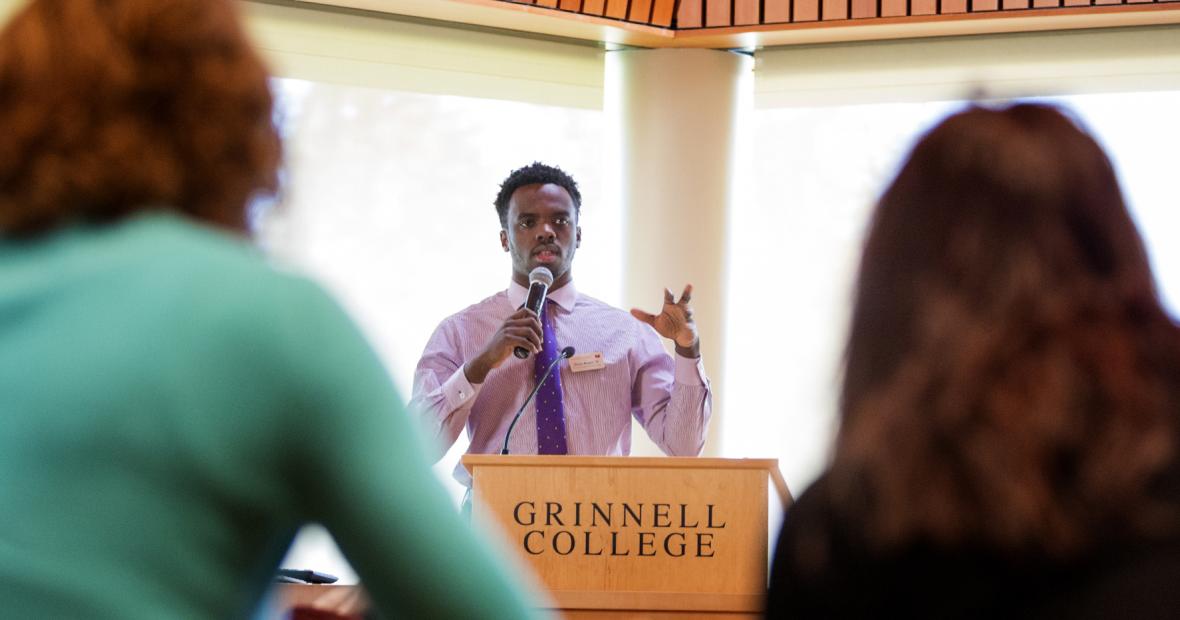A Community of Care
If you talk to Grinnell students about their experiences on campus, it’s likely that the term “self-governance” will be mentioned more than once. The concept of “self-gov” is integral to the Grinnell experience, but what does it really mean?
When Dixon Romeo ’16 arrived on campus in 2012, he could see that not everyone agreed about what self-governance meant. Was it about being a responsible member of the community, or did it have to do with individual student rights? After nearly four years at Grinnell, Romeo has developed a clearer idea of what self-governance really is.
We Versus Me
“I think the longer you’re at Grinnell, the more you tend to lean toward the idea of community governance and away from the idea that self-gov means you can do whatever you want,” says Romeo.
For him, the “me-first” mentality is a big misunderstanding of the importance of self-gov on campus. Creating a culture of respect in which individuals look out for each other and think about how their actions might affect the community as a whole is an integral part of the learning that takes place during college. Offering a study break to a friend who looks stressed, sitting with someone who’s alone in the dining hall, or helping to solve a conflict on your dorm floor — all of these are ways that Grinnell students enact self-gov and create a community of care and respect.
In addition to these daily examples of self-gov, working in the Student Government Association (SGA) helped Romeo develop an even deeper understanding of self-gov. As SGA vice president, Romeo interacts with many different students, staff, and faculty and has realized the importance of self-governance on such a diverse campus.
“While you’re here in this community, you need to have an opportunity to learn, both by making mistakes and by doing great things,” Romeo says. “But you can’t do that if it’s everyone for themselves. We have these self-governing tenets in order to make this a safe space in which everyone can learn and develop into the kind of person they want to be.”
Self-Gov at Parties
One example — many campus parties and events are watched over by student security.
“The idea that we, as students, become responsible for one another, go through training and sacrifice our Friday and Saturday nights so that the rest of the community can have a fun time in a safe way, that’s pretty amazing,” Romeo says. “If something goes wrong or there’s a conflict or someone needs help, I think it’s really important that you’re able to turn to your peers for help, because it’s about responsibility rather than authority.”
Evolving Definitions of Self-Gov
Romeo also acknowledges that the nature of self-governance will be different for each generation of Grinnellians. The issues that were important for the community during the 1970s are not the same concerns of the current student body, and the way self-gov is manifested reflects that change.
“Issues of identity are at the forefront of our current culture,” Romeo explains. “Ten, or even 15 years ago, no one would stand up in a crowd and announce whether they prefer female, male, or any other pronouns, because that wasn’t a part of the conversation.”
Another misconception: Self-governance only applies to situations outside of the classroom. Romeo feels that students need to extend that thinking to their academic activities as well.
“Learning how to state your case, disagree respectfully, and struggle to really understand other people’s opinions in the classroom is a big part of self-gov and of the liberal arts as a whole,” Romeo says.
Dixon Romeo ’16 is an economics major from Chicago.

